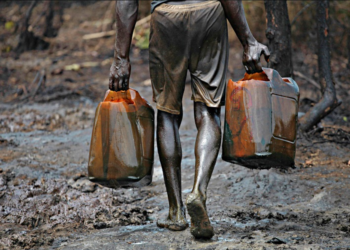Key highlights
- NEITI said sectors like health and education are suffering as a result of fuel subsidy payments.
- A full deregulation of the oil sector will lay to rest the conversation around oil swaps.
- Civil society needs to use the data available to fight for oil and gas sector reform so all Nigerians can benefit from the country’s resources.
The Executive Secretary of the Nigeria Extractives Industries Transparency Initiative (NEITI), Dr Orji Ogbonnaya Orji, has said that Nigeria spent an equivalent of five-year budgets for four major sectors on fuel subsidy payments.
He stated this during the Policy dialogue on the Utilization of Beneficial Ownership Data in the Fight Against Corruption in Nigeria’s Crude Swap Deals. The event was held on Thursday, April 13 in Abuja.
According to Dr Orji, it is important to use the data provided to advocate for sector reform. He called on civil society organizations to lead the advocacy to reform Nigeria’s oil and gas sector, so, the resources from the sector can be used for the benefit of all Nigerians. He said:
- “I wish to use this platform to draw attention to the urgent need to decide on the agitation for the removal of fuel subsidies. The full deregulation of the petroleum sector will permanently lay to rest the conversation around oil swaps.
- “NEITI’s latest policy brief titled; “The cost of fuel subsidy: A case for policy review”, revealed that Nigeria expended over N13 trillion ($74 billion) on fuel subsidies between 2005 and 2021.
- “The figure in relative terms is equivalent to Nigeria’s entire budget for health, education, agriculture, and defence in the last five years, and almost the capital expenditure for 10 years between 2011 and 2020.”
Other opportunity costs of fuel subsidy
Dr Orji also noted other economic opportunity costs of fuel subsidy which include:
- Slashing allocations for the health, education, and technology infrastructure sectors
- Deterioration of the downstream sector with the declining performance of Nigeria’s refineries and recording zero production in 2020
- Disincentivized private sector investment in the down and mid-stream petroleum sector
- Low employment generation since the refining process is done outside the shores of Nigeria
- Worsening National Debt; Declining balance of payment, Forex Pressures and depreciation of the Naira
- Product losses, inefficient supply arrangements-scarcity and attendant queues.
What you should know
According to Dr Orji, NEITI’s involvement is in alignment with their mandate of deepening engagements with credible civil society organizations like Policy Alert to bring to the fore and sustain advocacy on sector reforms.
He said NEITI has partnered with Policy Alert on a lot of projects and activities in the past, the most recent being, the “Wetin We Gain Campaign” which aims to promote public dialogue, accountability and prudent management of extractive resources and ensure that the benefits from the resources work for all.
Dr Orji advised civil society to step up advocacies before the expiration of the Buhari administration with clear recommendations to the next administration.






















